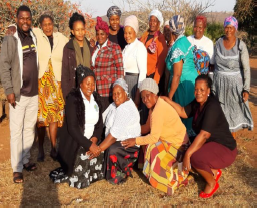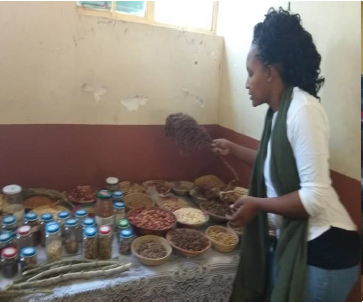PELUM Attends Seed Savers Exchange Meeting in South Africa

PELUM Swaziland and member organisation ACAT Lilima Swaziland participated in a two-day seed savers exchange meeting organised by Biowatch South Africa. The two-day event began with a
knowledge sharing and exchange session and concluded with a seed blessing ritual to celebrate farmer-managed seed systems and traditional seed varieties in Ingwavuma, KZN.
PELUM Attends Seed Savers Exchange Meeting in South Africa
PELUM Swaziland and member organisation ACAT Lilima Swaziland participated in a two-day seed savers exchange meeting organised by Biowatch South Africa. The two-day event began with a
knowledge sharing and exchange session and concluded with a seed blessing ritual to celebrate farmer-managed seed systems and traditional seed varieties in Ingwavuma, KZN.
Knowledge Sharing and Exchange Session

The learning and exchange visit was attended by the ACAT Project Coordinator, ACAT farmers/community facilitators, the PELUM Country Coordinator, Biowatch staff as well as farmers from the Ngwavuma and Mtubatuba communities. The purpose of this visit was to enable the farmers to share experiences relating to traditional seed preservation and to witness the cultural significance of traditional seed systems in local communities.
- Skills of seed production and storage: Participants wanted to learn from the successes of Ingwavuma farmers regarding how they manage to produce large quantities of quality seed.
The participants also sought to learn how to select the different varieties of maize seed which seems to be diminishing in their own communities. Furthermore, the participants were seeking advice on how to deal with problematic pests that tend to infest stored seed. - Maximizing production on smallholdings: Another key theme was that smallholder farmers struggle to increase seed production and were keen to learn from their successful peers on the strategies for maximising seed production on small fields and gardens while at the same time not compromising their ability to provide enough food for their families.
- Progress reports from different communities: The farmers were particularly keen to hear progress reports from their peers in different communities especially regarding successes, challenges, and future plans.
- Becoming Seed Merchants: The farmers seemed to all agree that they wanted to be able to produce more seed than they currently were able to. They stated that they had ambitions of eventually producing enough 50kg bags of seed that they are able to sell to other farmers in other communities. They were therefore very interested in finding out how they could achieve this.
Lessons for PELUM
- Designated Seed Field: We learned that one of the most effective ways to ensure high-quality seed is by growing all your seed separately from your food fields. Various crops can be grown on the same field but it needs to be specifically demarcated as a seed production field where other family members don’t disturb the crops. This is done to ensure that you can select the best crops to keep for seed and not find that they have been prematurely harvested by family members. The seed can be improved by exchanging and sharing the seed with other farmers. This ensures that should your own seeds get contaminated, you can always ask other farmers to share with you some of the untainted seed they have.
- Importance of passing down traditional knowledge: We learned that it is imperative to share knowledge on agro-ecological farming with the younger generation and this can be done by involving them in all your farming activities. This ensures that vital information on different crop varieties and how to farm them as well as how to preserve indigenous seed is preserved and passed down from generation to generation.
- Germination Rate Test: One quick and cheap method of testing the germination rate of your seed is to place 20 seeds in-between two sheets of damp newspaper in a dark place and check on them each day to see if germination occurs. After 7 days, they should all have germinated. If below 15 have germinated then that is not a good batch of seed. To check the health of vegetable and fruit seeds such as tomatoes and pawpaw, first, wash the seed before placing them in a glass of water. The seed that rises to the top of the glass is not fertile or viable. The good seed will always fall to the bottom of the glass.
- Importance of differentiating between the different kinds of seeds: It is very important for farmers to understand the difference between traditional/indigenous seeds which are also referred to as the mother of seeds. Such seeds usually have a local name. Once the seed has a numbered name, it is no longer an indigenous seed although it may still be an OPV seed. You can improve your traditional varieties through selection over time but that is a natural improvement. Hybrid seeds are also naturally bred but cannot be replanted in subsequent
planting seasons due to the fact that the desired traits or characteristics diminish over time.
That is why hybrid seeds are purchased each planting season which is not a sustainable option for smallholder farmers. The third and worst group of seeds are genetically modified organisms which are created in a laboratory and involve altering the genetic makeup of the crops in a way that would not occur naturally such as inserting foreign interspecies genes into the crop. - Differentiating between agroecology, permaculture, and organic farming: Organic farming implies that you must have certification and testing processes are done and so forth. It is important to note that we promote agroecology or permaculture, not organic farming to smallholder farmers as opposed to organic farming. We have a participatory guarantee system (PGS) as opposed to an external association to monitor compliance with natural farming practices.
- Storage of HARD or SOFT seed: The soft seed is easily attacked by pests as compared to a hard seed. We learned that farmers need to make an extra effort to store soft seed carefully because if not, you can easily lose it to pest damage.
- HIGHVELD AND LOWVELD CROPS: Each area has specific crops that suit those specific climatic conditions. Farmers need to ensure that they grow what is in line with their climatic conditions as well as a cultural way of life. Certain fruit trees are in line with traditional rituals and practices such as the Marula tree. Also worth noting is the fact that small grains and root crops are the keys in dry areas.
Moving Forward
PELUM will encourage our farmers to grow a third plot/field which will be used strictly for seed production. PELUM will also encourage the use of planting holes because this will increase water retention and fertility. Lastly, we noted that encouraging lead farmers is very important to keep them engaged and motivated to share skills and information with their peers.
PELUM will continue to promote and raise awareness on the importance of increasing the amount of our local indigenous seed as well as why it’s important to practice natural methods of pest management especially in storing seed.
An idea worth exploring for farmers who are interested in increasing their farmland is for them to request their neighbours to borrow/lend them fields or land that is currently not being used. This can ensure that food and seed production is increased in communities.

